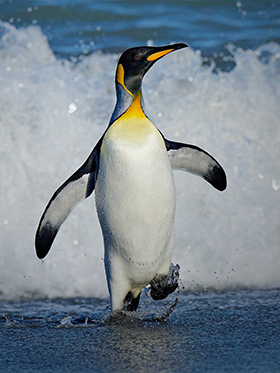

BirdLife South Africa, CapeNature, and SANCCOB have partnered to create a new African Penguin colony at De Hoop Nature Reserve on the southern coast of South Africa. This initiative aims to bridge the 600 km gap between the existing penguin colonies on the west and east coasts, providing a crucial refuge for this endangered species.
Part of this species' challenges is that their preferred prey, sardines, have shifted their distribution due to climate change and high fishing pressure on the West Coast. African Penguins will typically only breed on islands naturally free from terrestrial predators. Since there are no islands close to their preferred food sources, this presents a challenge. Hence, the initiative was taken to establish the colony at De Hoop.
Several innovative strategies have been employed in efforts to establish the new colony. These include installing predator-proof fencing to protect against terrestrial threats, using decoys and penguin calls in order to attract penguins to the new site. This project has also seen the release of over 200 hand-reared African Penguin chicks at the De Hoop site since 2021, with the goal of establishing a self-sustaining colony. The idea behind releasing young penguins onto the site is to encourage them to imprint on the new colony location, hopefully enhancing the likelihood of continued successful breeding in the area.
Cameras have also been installed to keep watch over the colony, monitor the breeding habits and pick up any potential threats to the colony.
Protecting the Penguins with DeepAlert
To ensure the safety and success of the new penguin colony, the project has partnered with DeepAlert, which sponsored the software used on the cameras in the area to send alerts on the presence of both people and wild animals in or around the penguins' protected area, providing crucial real-time information to the conservation team.
The DeepAlert system uses advanced computer vision and deep learning algorithms to detect and classify objects within the designated monitoring zone, including humans and wildlife. This allows the team to quickly respond to potential threats, such as predators or unauthorised human activity, and take appropriate action to protect the penguins.
While this has been an effective strategy, not having enough cameras to monitor the site does limit this effort to a certain degree.
Monitoring the colony's progress
The progress of the De Hoop penguin colony is being closely monitored, and some encouraging signs of success have been seen. The first successful breeding pair was observed here in 2022, and by 2023, a total of four pairs of African Penguins had been bred in the colony.
Using microchips and RFID readers has also provided some valuable insight into the movement and behaviour of the penguins that have been released at the site. Installing the RFID reader means that when the penguins, which have been microchipped, return to the area, this movement can be detected. So far, it has been confirmed that 13 of the African Penguins released as fledglings in 2021 and 2022 have been detected returning to the site. While these birds, which were rescued as chicks from other colonies and hand-reared at SANCCOB, are still too young to breed, this is encouraging as they may return to De Hoop once they start to seek out potential breeding sites. African Penguins typically start to breed at about four years of age.
Bridging the gap and building resilience
The project aims to increase the overall resilience of the species and ensure its long-term survival through the creation of a new breeding site.
"The creation of a new penguin colony at De Hoop Nature Reserve is crucial and will help secure the future of the African Penguin in South Africa," said Christina Hagen, the Pamela Isdell Fellow of Penguin Conservation at BirdLife South Africa, who leads the project. "With the support of DeepAlert's cutting-edge technology and the dedication of our partners, we are confident that we can effectively protect these penguins and monitor their progress as they establish a self-sustaining colony."
With the continuation of the project, the team remains optimistic that the De Hoop penguin colony will be successful in the long term.
For more information, contact DeepAlert,
| Tel: | +27 21 201 7111 |
| Email: | [email protected] |
| www: | www.deepalert.ai |
| Articles: | More information and articles about DeepAlert |

© Technews Publishing (Pty) Ltd. | All Rights Reserved.